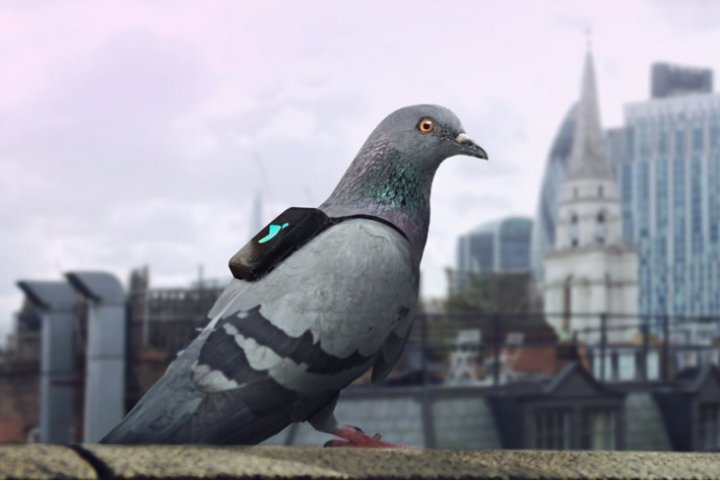
The once reviled birds are being put to use by British company Plume Labs, which has created a program called Pigeon Patrol U.K. This is how it works, the company straps air-quality sensors to a crack squad of elite pigeons from the U.K.’s large army of birds, which then take to the capital’s skies to monitor nitrogen dioxide levels. Instead of cooing, the company is tweeting out the results on its @PigeonAir Twitter handle.
The first designated bird took flight, alongside a flock of racing pigeons, from Brick Lane in the East of London. The tiny sensor on its back weighed in at just 25g, allowing the pigeon to move around freely. Another pigeon carried a miniature GPS tracker in order to map their route.
And we're off! The first #PigeonAir patrol flies from Brick Lane, monitoring air pollution as we go! pic.twitter.com/W8KnyrxnCe
— Pigeon Air Patrol (@PigeonAir) March 14, 2016
If you’re wondering how polluted your neighborhood is, you can even tweet @PigeonAir to make a request for a reading. Just don’t touch the birds if you spot them taking a quick break to ravage some discarded fish and chips in your area.
With scientists hailing it as a first for urban animals, Plume Labs’ founder Pierre Duquesnoy claims the idea comes from the use of pigeons as information carriers in the first and second world wars, reports the Guardian. Duquesnoy also commented on the practical element of selecting the birds for the task, pointing out their fast speeds (up to 80 mph) and low flight altitudes (100-150 feet) as critical factors.
“It is a health and environmental scandal for humans — and pigeons. We’re making the invisible visible,” Duquesnoy, told the British newspaper.
“Most of the time when we talk about pollution people think about Beijing or other places, but there are some days in the year when pollution was higher and more toxic in London than Beijing. That’s the reality.”
London’s increasing air pollution is a major health problem that reportedly contributes to the deaths of thousands of the city’s residents each year.
It’s a win-win for the pigeons themselves. Once colloquially referred to as “rats with wings,” they are now part of the U.K.’s fight against illegal air toxins. The Pigeon Patrol program is set to last three days. Thus far, the readings have shown high levels of pollution in Westminster (home to the country’s parliament), and moderate toxicity levels in Central London in general.
Editors' Recommendations
- Smart streetlights could help control the problem of light pollution
- Google’s Street View cars are helping build a giant map of global air pollution
